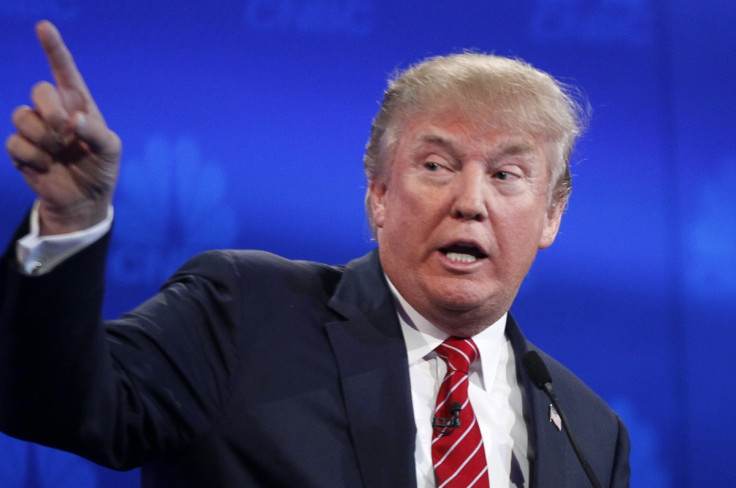Cheers Donald Trump, I'm sure Isis are thrilled you're doing their work for them

Donald Trump making inflammatory comments about race and immigration has become such a routine feature of the Republican presidential contest that at times it barely seems noteworthy. But sometimes he makes a statement of such extreme bigotry that it is impossible to ignore.
In late November, Trump said that he would consider requiring Muslim-Americans to register on a government database, or to carry special identification cards noting their faith. This week, in the aftermath of the San Bernardino attack, he followed up with a call for a "total and complete shut down" of the country's borders to all Muslims. As numerous commentators have pointed out, there are clear resonances of Nazi Germany's anti-Jewish policies. Trump has said he is not bothered by comparisons to Hitler.
Announcing his plan to close the borders, Trump cited polling data illustrating the violent hatred of Muslims for Americans. The data was gathered by the Center for Security Policy, an organisation described as an extremist group by the anti-racism campaigners at the Southern Poverty Law Center. Trump said his proposal was "probably not politically correct, but I don't care".
It has been condemned by politicians across the board. Hillary Clinton tweeted that the idea was "reprehensible, prejudiced, and divisive". Trump's rival for the Republican nomination, Jeb Bush, said Trump was "unhinged".
Former vice-president Dick Cheney said the idea "goes against everything we stand for and believe in". White House spokesman Josh Earnest said Trump was "seeking to tap into a darker side, a darker element, and try to play on people's fears in order to build support for his campaign".
Trump is not an elected official. He regularly bends facts to suit his case, misremembers, and makes outrageous statements – including mimicking a disabled reporter who called into question his dubious grasp of the facts.
It is easy to dismiss him as a lunatic, an extremist and opportunist, willing to switch positions according to what he thinks will be most popular. (Let's not forget that at the start of his campaign, it was Mexicans he wanted to target, not Muslims.)
But to dismiss Trump out of hand is also dangerous. Terrifying as it is, he is currently the Republican Party's frontrunner. Analysts such as Nate Silver predict Trump's support will fall away as voting actually begins, but the frontrunner he remains. Pundits have said numerous times that Trump has gone too far; each time, he has been rewarded instead with a bounce in the polls.
Trump's entire campaign is predicated on the notion that a significant proportion of Republican voters are xenophobic. Clearly, as the packed out rallies attest, an audience exists for this bigotry.
Polling by Gallup has found that while Muslim-Americans are among the most integrated religious groups in the US, a significant proportion of the public holds negative views of Islam. One third of people who said they were not prejudiced against Muslims still held unfavourable views, while nearly half of all American Muslims said they have experienced racial or religious discrimination.
Analysts have long noted a convergence in the aims of the far right and of extremist Islamist groups. Both believe in a clash of civilisations between east and west, and both encourage the idea that western and Islamic societies are inherently incompatible, that the people cannot live together
Trump's statements are not happening in a vacuum. We live in a context where hate crimes against Muslims are on the rise, in America as well as in the UK and France. Hate speech from a prominent individual – someone running for the highest political office in the world – undoubtedly has an effect.
Simplistic as it sounds, there are already too many people who believe all Muslims are terrorists. The perception is encouraged by mainstream political and media discourse: domestic counter-terrorism policies on both sides of the Atlantic that paint Muslims as the enemy within, a steady flow of discriminatory headlines, political speeches about the Muslim threat.
Trump's comments are at the extreme end of the wedge but they spring from a context of normalised anti-Muslim prejudice. It is alarming but perhaps not entirely surprising that his views have such an enthusiastic audience. His statements serve to legitimise the worst views in society – hatred and intolerance – and to encourage fear and mutual distrust to fester and grow.
Analysts have long noted a convergence in the aims of the far right and of extremist Islamist groups. Both believe in a clash of civilisations between east and west, and both encourage the idea that Western and Islamic societies are inherently incompatible, that the people cannot live together. These different forms of extremism and bigotry are two sides of the same coin.
There is a grim irony, then, in the fact that Trump is essentially doing the work of Islamic State (Isis) for them. The White House Summit on Countering Violent Extremism earlier this year noted that IS (Daesh) hopes Muslims in the West are demonised and discriminated against, so they will be alienated from the countries in which they live. After the Paris attack, IS operatives wrote on social media that they hoped hate crimes against Muslims would follow.
As former IS hostage Nicolas Henin wrote recently: "Daesh believe that Muslims have no place in a Western society, and that the two worlds can't coexist." This is exactly the view put forward by Trump: not only ineffective as a policy suggestion, but morally repugnant and bigoted beyond belief.
© Copyright IBTimes 2025. All rights reserved.






















